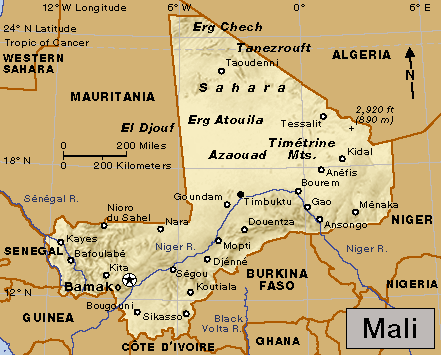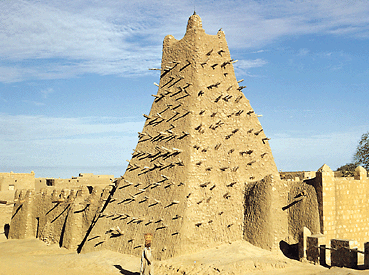French President Receives Hero’s Welcome in Mali
Monday, February 4th, 2013February 4, 2013
French President François Hollande paid a triumphant visit on February 2 to the fabled city of Timbuktu, where he received a rapturous welcome from crowds chanting “Vive la France!” and waving banners stating “Papa François, the mysterious city welcomes you.” French and Malian forces drove Islamist jihadists out of the city on January 27 and into the vast desert to the north. (Mali was once a French colony.) However, residents of Timbuktu worry that the rebels will return as soon as the French withdraw their troops. “These Islamists, they have not been defeated,” Moustapha Ben Essayouti, a member of a locally prominent family, told French correspondents. “Hardly any of them have been killed. . . . If France leaves, they will come back.” While praising French and Malian troops for the “exceptional mission,” President Hollande acknowledged that “the fight is not over.” In a later speech in Mali’s capital, Bamako, he declared, “We will be with you to the end, all the way to northern Mali.”
President Hollande’s government announced on January 12 that it was sending troops into Mali to help wrest the nation back from Islamic jihadist expansion. Some 1,900 African troops–including soldiers from Benin, Burkina Faso, Chad, Niger, Nigeria, Senegal, and Togo–were deployed to Mali as part of a United Nations-backed African intervention force to drive the insurgents northward.

Franch and Malian troops have driven Islamist rebels out of Timbuktu and into the desert to the north. (World Book map; map data © MapQuest.com, Inc.)
Islamist rebels gained control of much of the north in 2012 after a military coup in Mali’s capital, Bamako, created a power vacuum. At the core of the Islamist insurgency are the remnants of a now-defunct Algerian rebel group that was largely driven out of Algeria and into the unpoliced desert land in northern Mali sometime after the Algerian civil war was settled in 1999. A loose alliance of Algerian and Mauritanian fighters, they are believed to be connected to an al-Qa’ida offshoot known as “al-Qa’ida in the Islamic Maghreb.” (Maghreb refers to northern Africa west of Egypt). The group aims to overthrow the Algerian government and institute an Islamic state under Shar’iah law. The group operates in Algeria, Mauritania, Niger, and other ungoverned areas of the Sahel region.
Additional World Book articles:
- Algeria 1991 (a Back in Time article)
- Algeria 1992 (a Back in Time article)
- Algeria 1999 (a Back in Time article)



